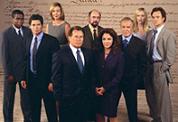 “The West Wing” will go down in television history as one of the most wonderfully relevant shows and enduring DVD buys, even if its series finale was, dang it, such a bore.
“The West Wing” will go down in television history as one of the most wonderfully relevant shows and enduring DVD buys, even if its series finale was, dang it, such a bore.
I enjoyed reading Michael Kress’s blog piece about the series, and appreciated the reminder that the finale was coming up. What a shame that it had to be such an anti-climax, but it really had no chance to rank up there with significant series finales such as “Seinfeld,” “Friends,” and “Cheers,” and going even further back, “M*A*S*H*” and “The Carol Burnett Show.” At least when those shows ended, the “Friends” were still friends, most of the “Cheers” characters were still around the bar, and Hawkeye was still Hawkeye. Yes, those shows had transitions as well, but the new characters had become family by the time the show ended. Not so with Alan Alda’s Arnold Vinick and Jimmy Smits’s Matt Santos. They were likeable, but they hadn’t become beloved.
And what of the beloved ones? Well, the recent plotline for “West Wing” was true to the nature of the show, but it didn’t make for a great ending. The difference between the first show (aired immediately prior to the finale) and the last was noticeable, if not dramatic. The eclectic group of young politicos and youthful career wonks that initially surrounded President Bartlett had gone their different directions. Leo passed away. Toby was muted. Sam ran for Congress and ended up at a cushy law firm. Josh lost much of his charm when he went on the road. Will was less interesting when he lost Toby and Sam to banter with. C.J., Charlie, and the Bartletts endured to the end, as did Donna in her new role, but of that group, only C.J. was part of the original group of stars. (Martin Sheen’s Bartlett was barely more than a cameo until the series picked up steam).
The enduring thing about “The West Wing” will be the nature of its themes and topics, and the dialogue which focused on intelligent issues of government, such as laws, policies, departments, little known facts, and current events (especially in its early years). It examined presidential decision-making and policies in almost every show, notably “A Proportional Response,” “The Short List” and “The Lame Duck Congress.” It looked at governmental procedures (“The Stackhouse Filibuster,” “Ways and Means”) and examined the relationship between faith and leadership (“Shibboleth,” “Two Cathedrals”). It took a hard look at some of our more ridiculous but enduring traditions (“The Leadership Breakfast,” “The U.S. Poet Laureate”) and inserted the occasional and artful dose of Latin (“Eppur Si Muove,” “Posse Comitatus,” “Post Hoc, Ergo, Propter Hoc).
I also appreciated President Bartlett’s memorization of scripture and his reciting of it in the midst of policy discussions. Such leadership is not–and has never been–a violation of church and state, and was part of the finale, via his discussion with his successor, Pres. Santos, about the tradition of including a Bible quote in the Inaugural speech.
At the end, President Bartlett was looking out the window of the former Air Force One when asked by Mrs. Bartlett what he was thinking about. “Tomorrow,” he said. I wish it would have been, “What’s Next?”

